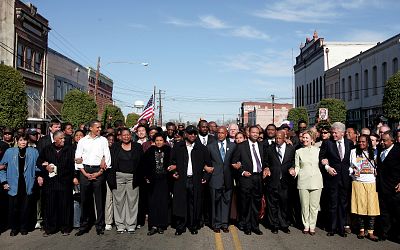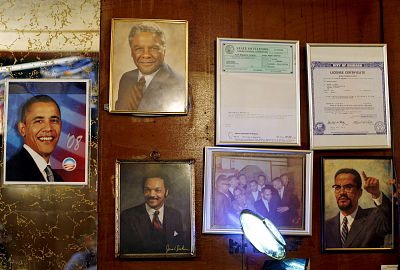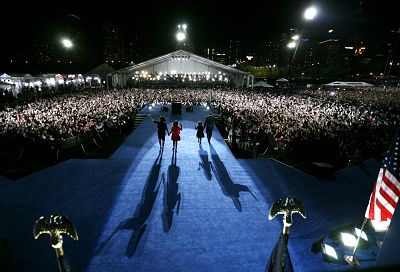The former first lady came to the race as the front-runner in the polls, but that's not how it ended.
Unlike her husband in 1992, Hillary Clinton faces an African American opponent, Barack Obama, in her bid for the Democratic nomination. For months, polls show her running at least even with Obama with black voters, and far ahead overall. When Obama upsets her in Iowa, though, it all changes.
 ADVERTISEMENT
ADVERTISEMENT
 ADVERTISEMENT
ADVERTISEMENT
After John Kerry's loss to George Bush in 2004, the Democratic nomination was again up for grabs, and this time black voters were positioned as power brokers from the start. Both of the two leading candidates had strategies that depended on support from African Americans.
Hillary Clinton came to the race as the front-runner in the polls. Since the end of her husband's presidency and her election to the Senate in 2000, the question had been when — not if — she would seek a Clinton restoration. African Americans had been an unwavering source of support for Bill Clinton, and Hillary aimed to leverage those deep ties in her own campaign.
#embed-20190604-black-votes-nav iframe {width: 1px;min-width: 100%}
Obama, meanwhile, was a new national star, with the potential to go further than any black politician had ever gone in America. His keynote address at the 2004 Democratic convention, which framed his own unlikely life story as a celebration of the American dream, had struck an optimistic public nerve that defied ideological barriers. As he entered the '08 race, Obama's name recognition was wide and so was his personal popularity. There was a sense, as civil rights veteran Roger Wilkins put it, that he was the first black candidate with an actual chance of winning. ("Obama thrills blacks who see shot at history," Jill Lawrence, USA Today, Jan. 18, 2007.)
The coalition Obama sought to build required deep African Americans support, which early polling suggested would not be automatic. An ABC News/Washington Post survey in January 2007, just before Obama declared his candidacy, put him 24 points behind Clinton overall — and 40 points behind among black voters. Polling also suggested a gender gap among African Americans, with Clinton running stronger with black women than men.
The importance of the black vote was underscored in March 2007, when Clinton and Obama attended the annual commemoration of the "Bloody Sunday" clashes in Selma, Alabama, between police and civil rights marchers in 1965. That Clinton was accompanied by her husband, making one of his first public appearances with her since she began her campaign, seemed telling. Obama, for his part, told a church audience that he was the "offspring" of the civil rights movement. "Don't tell me I'm not coming home when I come to Selma," he said. ("Marching together for now," Glenn Thrush, Newsday, March 5, 2007.)
The race tightened somewhat but mostly stayed in a holding pattern through 2007. Polls generally put Clinton ahead of Obama by double-digits overall and suggested she was in position to win the black vote or at least gain a significant share of it. In his Washington Post column, Eugene Robinson theorized about why black voters seemed reluctant to unite behind Obama:
"I hear from African Americans who are excited about Obama's candidacy but who suspect that somehow, when push comes to shove, 'they' won't let him win. It's unclear who 'they' might be — white voters, the 'power structure,' the alignment of the stars — and it's unclear how 'they' are going to thwart Obama's ambition. The point is that, somehow, he'll be denied." ("Obama and the 'They' Sayers," Eugene Robinson, The Washington Post, July 31, 2007.)
The sense that Clinton was a safer bet extended to some black leaders, and there may have been a generational component.
#embed-20190521-dem-pres-primary-results-by-year iframe {width: 1px;min-width: 100%}
In Alabama, for instance, Joe Reed, the longtime head of the state's most powerful black political group explained his endorsement of Clinton by saying: "She's electable. She's acceptable. What else is there?" ("Black Leaders Torn Over Endorsement," Shailagh Murray, The Washington Post, Dec. 1, 2007.) It was the same reasoning Reed had used decades earlier when he backed Walter Mondale over Jesse Jackson in the 1984 campaign. As '07 closed out, Clinton actually had more endorsements from Congressional Black Caucus members than Obama, including from stalwarts like Georgia's John Lewis and New York's Charles Rangel.
Obama did have firepower of his own, however. Jackson backed him early on, along with his son, Rep. Jesse Jackson Jr. The nation's only black governor, Deval Patrick of Massachusetts, was with him, too, and the Rev. Joseph Lowery, one of the leading figures of the civil rights movement, was also an early supporter. Obama was banking on a slingshot effect of sorts. "If I do well in Iowa, and if I do well in New Hampshire," he said, "then by the time we get to South Carolina, I think we will have dispelled the notion that somehow whites won't vote for African Americans." ("Obama and the 'They' Sayers," Eugene Robinson, The Washington Post, July 31, 2007.)
South Carolina's primary would enjoy even more stature this time around. After the '04 trial run, the Democratic National Committee, in a nod to the importance of black voters, decided to make the state's primary one of four officially sanctioned lead-off contests in 2008. It would bat clean-up, at the end of January, after Iowa, New Hampshire and caucuses in Nevada.
On the night of Jan. 3, Obama won the Iowa caucuses, drawing strong support from young voters and those angered by Clinton's Senate vote to authorize the Iraq war. In a further surprise, Clinton finished third, edged out by John Edwards, the former senator from North Carolina and vice presidential nominee four years earlier. All of a sudden, it seemed, Obama was in position to deliver an early — and stunning — knockout blow if he could just defeat Clinton in New Hampshire. Polls immediately after Iowa showed him running away with the race, but Clinton capitalized on a last-minute Obama misstep and engineered an upset win of her own in the Granite State, which she followed up with a victory in Nevada.
Now it was up to South Carolina and a Democratic electorate that figured to be at least 50 percent African American. Clinton had righted her ship and now had her own opportunity to pull away from Obama. A win in the state, or at least a competitive showing with black voters, would set her up well for upcoming contests in other states with large black populations.
But as Obama had predicted, his victory in Iowa altered the contours of the South Carolina campaign. After trailing Clinton in state polls throughout '07, Obama was now running ahead. Previously hesitant black voters appeared to be coming around.
This seemed to irritate Bill Clinton, who had begun taking swipes at Obama. In one interview, he called the Obama candidacy "a roll of the dice." In another, he branded Obama's early opposition to the invasion of Iraq "a fairy tale." Then, with Obama gaining ground, Clinton tried pre-emptively to diminish the significance of an Obama win in South Carolina, saying: "Jesse Jackson won South Carolina in '84 and '88. Jackson ran a good campaign. And Obama ran a good campaign here." ("Obama is Big Winner in S.C.," Dan Balz, Anne E. Kornblut and Shailagh Murray, The Washington Post, Jan. 27, 2008.)
The former president's posture provoked a public dressing down from Rep. James Clyburn, the state's sole black congressman, who told Clinton to "chill it." ("Focus shifts from Hillary to Bill in South Carolina," The Guardian, Jan. 22, 2008.) A decade earlier, author Toni Morrison had dubbed Clinton "our first black president." Now, invoking that famous line, Clyburn remarked: "We are still looking for the first black president." ("Sharp attacks for both sides," Glenn Thrush, Newsday, Jan. 25, 2008.) Officially, Clyburn was neutral, but his message was clear.
Hillary Clinton herself stirred up racial sensitivities in an effort to portray Obama as a skilled orator with little ability to produce results. To make the point, she drew an analogy to the civil rights movement. For all of Martin Luther King Jr.'s eloquence in pushing for an end to segregation, she said, "it took a president" — Lyndon Johnson, a white man — "to get it done." The ensuing controversy left Clinton trying to justify the remark just as South Carolinians made up their minds. "She, I think, offended some folks who felt that somehow diminished King's role in bringing about the Civil Rights Act," Obama said. ("Clinton's King Comment 'Ill-Advised,' Obama Says," Anne E. Kornblut and Perry Bacon Jr., The Washington Post, Jan. 14, 2008.)
By primary day, Obama was expected to win, but his final margin was still jarring in its scope: 55 percent of the vote, nearly 30 points better than Clinton, and a near-sweep of the state's counties. In victory, Obama won a quarter of the white vote, with Clinton and Edwards — a native South Carolinian — taking the rest. But it was African Americans who gave Obama his landslide. Enthusiasm among black voters was staggering; they made up 55 percent of the primary electorate, with Obama claiming 78 percent of their votes, according to NBC News' black voter data analysis.
The drama in South Carolina had lingering effects. Just months earlier, it had seemed plausible that Clinton would outperform Obama with black voters. Now, though, Obama's African American support skyrocketed everywhere. Endorsements poured in from black leaders who'd been on the fence, or even in Clinton's camp. Lewis withdrew his support of Clinton and signed on with Obama. "I want to be on the side of the people," he explained. ("John Lewis Changes Endorsement to Obama," Jeff Zeleny, The New York Times, Feb. 28, 2008.)
The calculations of white Democratic leaders were changed by South Carolina — and by the Clintons' behavior. Offended in particular by Bill Clinton's politicking, Sen. Ted Kennedy of Massachusetts endorsed Obama after South Carolina.
The campaign didn't end in South Carolina, though. Instead, clear demographic divisions developed and then deepened. Obama began rolling up well over 80 percent of the black vote and combining it with strong support from young voters and college-educated white liberals. Clinton, meanwhile, did well with Latinos and, as the race unfolded, better and better with white voters without college degrees.
Campaign trail flare-ups only reinforced these new coalitions. Scrutiny over the blistering rhetoric of Obama's pastor, Jeremiah Wright, boosted Clinton's standing with blue-collar whites, even as Obama's response — a lengthy oration on the subject of race — strengthened his own base's loyalty to him.
Each candidate's bandwagon was big enough to win millions of votes, hundreds of delegates and numerous states, but neither's was big enough to decisively put the race away.
Instead, Obama amassed a small but critical advantage in the pledged delegate count, leaving Clinton to hope that superdelegates — elected officials and party leaders with automatic votes at the convention — would ultimately rally to her and her claims of superior electability. But that made it easy for Obama's team to claim that Clinton was attempting an undemocratic end around after falling short during the primary season. Plus, Clinton's electability case was undermined by polls that showed Obama running just as well against John McCain, the soon-to-be Republican nominee.
In early June, the final day of primaries ended with another split: Obama winning Montana and Clinton taking South Dakota. But his overall lead with pledged delegates remained intact and, recognizing that the superdelegates were immovable, Clinton gave way at last.
She and Obama had each received more than 17 million votes nationally. In state after state, turnout records had been shattered. No Democratic primary race had ever attracted such energy. In a contest so tight, any number of factors could plausibly be deemed decisive, but the importance of black voters to the emergence of the first African American major party presidential nominee was impossible to overstate.
#embed-20190604-black-votes-nav-footer iframe {width: 1px;min-width: 100%}













